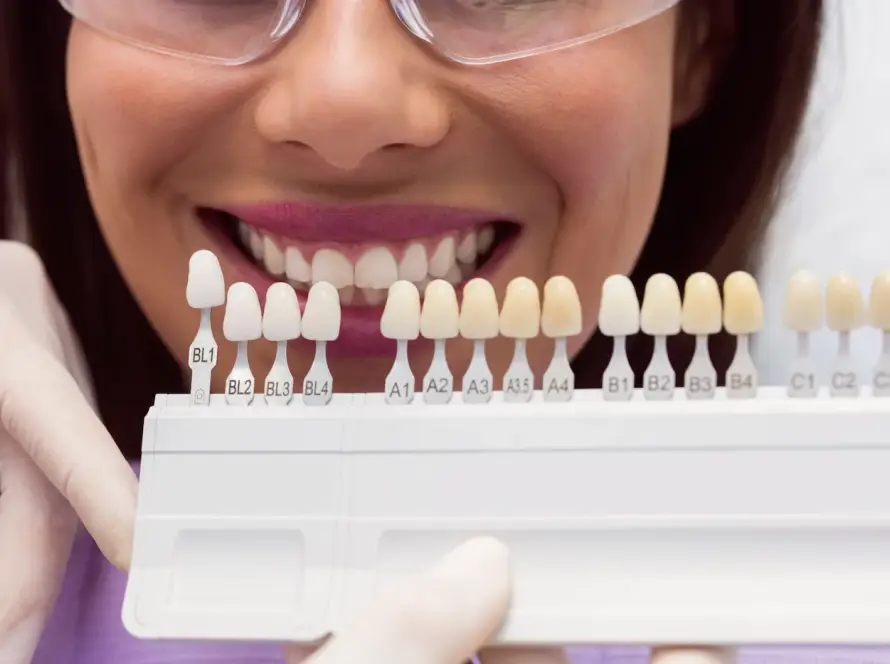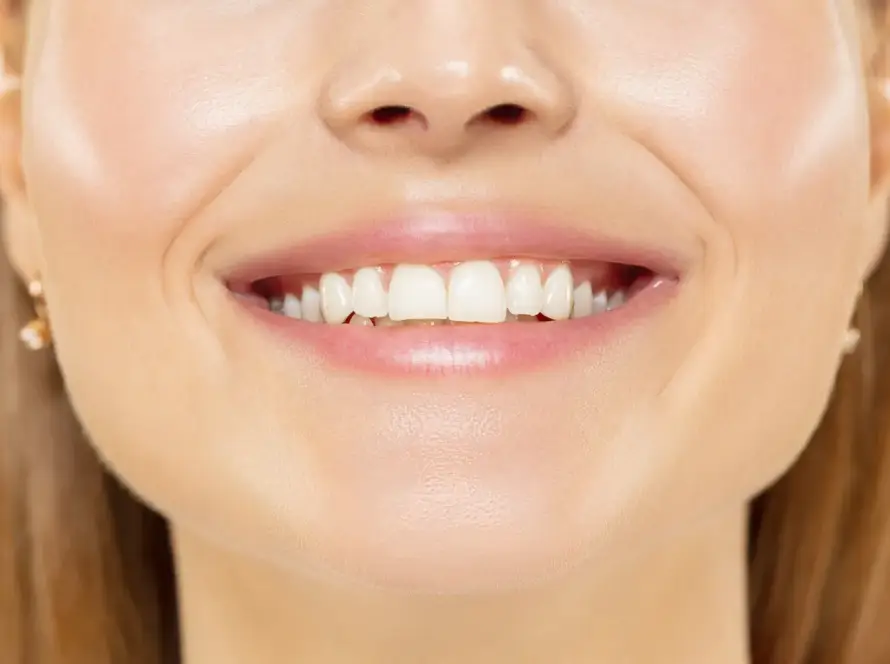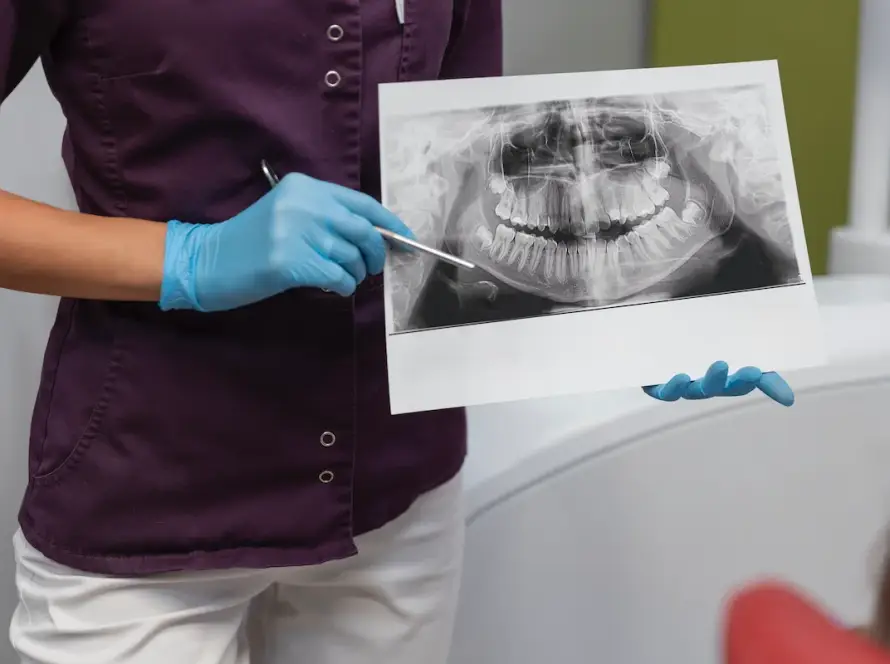Dental bridges are prosthetic devices used to fill gaps left by missing teeth. They are anchored to the remaining natural teeth or implants adjacent to the gap. The primary function of dental bridges is to restore a patient’s smile, improve chewing efficiency, and maintain facial structure.
Types of Dental Bridges
There are several types of dental bridges available, each suited to different clinical situations:
- Traditional Bridges: These consist of one or more false teeth and are held in place by dental crowns cemented onto the adjacent healthy teeth.
- Cantilever Bridges: These are used when there are teeth on only one side of the gap. The false tooth is anchored by a crown on one adjacent tooth.
- Maryland Bridges: These use a metal or porcelain framework bonded to the backs of the adjacent teeth. This type aims to preserve the adjacent teeth, minimizing alteration.
- Implant-Supported Bridges: These are anchored using dental implants rather than crowns on natural teeth, offering superior strength and stability.
Benefits of Dental Bridges
Dental bridges offer several advantages, including but not limited to:
- Restoration of Function: They enable proper chewing and speaking, which may be compromised by missing teeth.
- Preventing Teeth Movement: They help maintain the alignment of remaining teeth, preventing them from shifting into the gap.
- Aesthetic Improvement: They provide a natural appearance, enhancing the patient’s smile and boosting self-confidence.
- Long-Term Oral Health: By filling in gaps, they help in maintaining the overall health of the mouth and prevent issues that can arise due to missing teeth.
Procedure Overview
The dental bridge procedure generally involves multiple visits to the dentist:
- Initial Consultation: Evaluation of the patient’s oral health and discussion of the best bridge type.
- Preparation: The adjacent teeth are prepared by removing a portion of enamel to accommodate the crowns.
- Impressions: Molds of the teeth are taken to create a custom bridge.
- Temporary Bridge: A temporary bridge is placed while the permanent one is being made.
- Fitting: The permanent bridge is fitted, adjusted, and cemented into place.
Maintenance
Proper care is essential to ensure the longevity of dental bridges. Regular dental check-ups, maintaining good oral hygiene, and avoiding hard foods that could damage the bridge are crucial steps. Dentists often recommend using a special floss to clean under the false tooth.
Dental bridges are a vital option in restorative dentistry, providing both practical and aesthetic benefits to patients who have lost one or more teeth.
Reasons to Opt for Dental Bridge Treatment in Turkey
Choosing Turkey for dental bridge treatment offers a multitude of benefits, positioning the country as a favored destination for dental tourism.
Cost-Effective Treatment
- Dental care costs in Turkey are significantly lower than those in many Western countries.
- Lower labor and operational costs contribute to affordable treatment without compromising quality.
- Inclusive treatment packages often cover expenses such as accommodation, transportation, and post-procedure care.
High-Quality Care
- Accredited Clinics: Many Turkish clinics hold international accreditations, ensuring adherence to global standards.
- Advanced Technology: Clinics are equipped with state-of-the-art technology, including CAD/CAM systems, for precise and efficient treatment.
- Experienced Professionals: Dentists in Turkey are often trained globally, bringing a wealth of international expertise.
Quick Appointments and Short Waiting Times
“Turkey’s healthcare system is known for its efficiency, enabling patients to receive prompt consultations and treatments.”
- The streamlined processes allow for quicker appointment scheduling.
- Reduced waiting times mean patients can promptly address their dental issues.
Cultural and Travel Experience
- Turkey is a country rich in history, culture, and natural beauty, providing an excellent backdrop for dental tourism.
- Patients can combine their treatment with a vacation, exploring cities like Istanbul, Cappadocia, and Antalya.
Comprehensive Care Packages
- Many clinics offer all-inclusive packages, which may include initial consultation, treatment, follow-up care, and additional services like airport transfers.
- These packages are designed to provide a seamless and stress-free experience.
Effective Communication and Patient Support
- Numerous clinics provide multilingual staff to accommodate international patients, enhancing communication.
- Dedicated patient coordinators assist with every aspect of the treatment journey.
Positive Patient Testimonials and Reviews
- Turkey’s reputation is well-supported by numerous positive patient testimonials.
- Many patients have reported high satisfaction levels with their treatments, contributing to Turkey’s growing acclaim.
Legal and Ethical Standards
- Turkish health regulations ensure treatments are carried out under strict guidelines, providing safe and ethical dental care.
- The Turkish Ministry of Health regularly monitors and inspects clinic standards.
By considering these diverse and compelling reasons, patients can make informed decisions about opting for dental bridge treatment in Turkey, confident in receiving high-quality and cost-effective care.
Types of Dental Bridges
In the realm of restorative dentistry, there are several types of dental bridges available to address various patient needs. Each type varies in design, material, and application, allowing dental professionals to tailor treatment to individual cases.
Traditional Dental Bridges
Traditional dental bridges are the most common type used. They consist of two dental crowns anchored to adjacent healthy teeth, known as abutment teeth, with a pontic (artificial tooth) in between. This type is effective for replacing single or multiple missing teeth and is typically made from ceramic or porcelain fused to metal.
Cantilever Dental Bridges
A cantilever dental bridge is similar to a traditional bridge but only involves one abutment tooth. This type is used when there’s only a single tooth adjacent to the missing tooth gap. While effective, cantilever bridges are primarily recommended for the front teeth due to the reduced bite pressure compared to molars.
Maryland Bonded Bridges
Maryland bonded bridges, also known as resin-bonded bridges, utilize a metal or porcelain framework bonded to the back of the adjacent teeth. This type does not require extensive enamel removal from the abutment teeth, preserving more of the natural tooth structure. Maryland bridges are typically used for missing front teeth due to their conservative approach.
Implant-Supported Bridges
Implant-supported bridges employ dental implants rather than tooth-supported crowns. Each missing tooth has a corresponding implant with a bridge attached to these implants. This type offers superior stability and is ideal for patients missing multiple teeth in a row. Though the procedure is more time-intensive and costly, it provides a durable and long-lasting solution.
Factors Influencing Choice of Bridge
Several factors influence the choice of dental bridge for a patient, including:
- Location of the missing tooth/teeth: Front teeth vs. molars may require different types.
- Condition of abutment teeth: The health and strength of adjacent teeth affect suitability.
- Patient’s oral and overall health: Considerations like bone density and gum health play a role.
- Aesthetic requirements: The appearance and color matching might dictate the material used.
Dentists typically evaluate these factors through comprehensive oral examinations and consultations, ensuring the most appropriate and effective dental bridge type is selected.
Step-by-Step Dental Bridge Procedure
Initial Consultation and Evaluation
- Examination and Diagnosis:
- The dentist examines the patient’s oral health.
- X-rays and impressions of the teeth are taken to assess suitability.
- Treatment Planning:
- The dentist discusses various dental bridge options.
- A treatment plan tailored to the patient’s needs is established.
Tooth Preparation
- Administration of Local Anesthesia:
- Local anesthesia is applied to the area surrounding the abutment teeth.
- Tooth Shaping:
- The abutment teeth are filed down to create space for the crowns.
- Adequate reshaping ensures optimal fit and function of the dental bridge.
Impression Taking
- Creating Dental Impressions:
- Precise dental impressions of the reshaped teeth and the gap are taken.
- The impressions serve as a blueprint for the bridge fabrication.
- Selection of Shade:
- A shade guide is used to match the natural color of the patient’s teeth.
- Ensures aesthetic alignment with existing teeth.
Temporary Bridge Installation
- Fitting Temporary Bridge:
- A temporary bridge is placed to protect the exposed gums and reshaped teeth.
- Maintains aesthetics and functionality during the wait for the permanent bridge.
Fabrication of Dental Bridge
- Laboratory Work:
- The dental impressions are sent to a dental lab.
- Skilled technicians fabricate the permanent dental bridge.
- The process takes approximately two weeks.
Permanent Bridge Installation
- Removing Temporary Bridge:
- The temporary bridge is removed carefully.
- Fitting and Adjusting Permanent Bridge:
- The dentist positions the permanent bridge.
- Adjustments are made to ensure a comfortable fit.
- Cementing the Bridge:
- The dental bridge is permanently cemented using strong dental adhesive.
- The dentist checks the bridge for proper alignment and occlusion.
Post-Procedure Care
- Instructions Given:
- The patient receives guidance on maintaining oral hygiene.
- Information on dietary restrictions and activities during the healing period is provided.
- Follow-up Appointments:
- Scheduled to monitor the condition of the dental bridge.
- Dental assessments ensure the long-term success of the treatment.
Pre-Treatment Consultation and Evaluation
A pre-treatment consultation is crucial for evaluating the patient’s eligibility for a dental bridge. The following steps are typically involved in this phase:
- Initial Assessment:
- The dentist gathers the patient’s medical and dental history.
- Questions are posed regarding any existing health conditions, medications, and past dental treatments.
- Oral Examination:
- A comprehensive examination of the mouth is performed.
- The dentist checks for signs of gum disease or other oral health issues that could impact the placement of a dental bridge.
- Diagnostic Imaging:
- Radiographs or X-rays are taken to get a detailed view of the patient’s oral structure.
- Digital scans may also be utilized for more precise imaging and bridge design.
- Occlusal Analysis:
- The dentist evaluates the patient’s bite and jaw dynamics.
- Any irregularities in bite can impact the functionality and longevity of the dental bridge.
- Discussion of Options:
- The dentist presents various bridge types (traditional, cantilever, Maryland, or implant-supported).
- The pros and cons of each type are discussed, along with the most suitable option for the patient based on their oral health and aesthetic goals.
- Cost Estimation:
- A preliminary cost estimation is provided, encompassing the procedure, materials, and any additional treatments required.
- Payment plans and insurance coverage options are also discussed.
- Treatment Plan Development:
- A customized treatment plan is formulated, outlining each step of the procedure.
- The timeline for the treatment is established, including appointments for fitting and follow-ups.
- Patient Education:
- The patient is educated on what to expect throughout the treatment process.
- Post-treatment care instructions, potential side effects, and the maintenance of the dental bridge are explained.
Finding the Right Dental Clinic in Turkey
When seeking dental bridge treatment in Turkey, selecting the right clinic is paramount. The following guidelines can help ensure a successful and satisfactory experience.
Research and Reviews
- Check Credentials: Verify the qualifications and certifications of the dental professionals at the clinic. Look for dentists who are members of reputable dental associations.
- Online Reviews: Read patient reviews and testimonials to get a sense of the clinic’s reputation. Websites like Google, Yelp, and dedicated medical tourism platforms provide detailed feedback.
- Before-and-After Photos: Many clinics showcase their work through before-and-after images. These can provide insight into the quality of their dental bridge procedures.
Licensing and Accreditation
- International Accreditations: Opt for clinics with international accreditations, such as JCI (Joint Commission International). This signifies adherence to high standards of care.
- Local Licensing: Ensure the clinic is licensed by Turkish health authorities, which guarantees compliance with national healthcare regulations.
Technology and Equipment
- Modern Equipment: Advanced technology and state-of-the-art equipment are indicators of a clinic’s commitment to quality care. Look for clinics that use digital X-rays, 3D imaging, and CAD/CAM systems.
- Sterilization Standards: Confirm that the clinic adheres to strict sterilization and hygiene protocols to minimize the risk of infection.
Cost Transparency and Payment Plans
- Detailed Cost Breakdown: A reputable clinic will provide a transparent breakdown of treatment costs, including consultations, procedures, aftercare, and any potential additional fees.
- Payment Options: Check if the clinic offers flexible payment plans, insurance compatibility, or financing options.
Communication and Comfort
- Language Proficiency: Ensure there is no language barrier. Clinics catering to international patients typically have multilingual staff.
- Personal Comfort: Assess the overall environment of the clinic. Friendly staff and a comfortable setting can ease anxiety associated with dental procedures.
Location and Accessibility
- Proximity to Accommodation: Choose a clinic located near accommodations to facilitate convenience, especially for follow-up visits.
- Transportation Services: Some clinics offer transport from the airport or hotel, which can be a beneficial service for international patients.
By carefully evaluating these factors, individuals can choose a dental clinic in Turkey that best meets their needs for dental bridge treatment.
Cost of Dental Bridge Treatment in Turkey
When considering dental bridge treatment in Turkey, several factors influence the overall cost. Understanding these elements helps patients make informed decisions about their treatment plans.
Factors Influencing Costs
- Type of Dental Bridge:
- Traditional Bridges: Involve specifically prepared crowns for the supporting teeth.
- Cantilever Bridges: Used when there is only one adjacent tooth.
- Maryland Bridges: Use metal or porcelain wings bonded to existing teeth.
- Implant-Supported Bridges: Require dental implants for support.
- Materials Used:
- Porcelain-Fused-to-Metal: Combines durability with aesthetics.
- Ceramic: Offers a more natural look and color matching.
- Gold Alloys: Known for strength and longevity.
- Complexity of the Case:
- Simple cases with minimal adjustments cost less.
- Complex cases with multiple missing teeth or other dental issues are more expensive.
- Clinic Location and Reputation:
- Major cities such as Istanbul and Ankara may have higher costs due to higher operating expenses.
- Well-known clinics with international accreditation tend to charge more.
- Dentist’s Expertise:
- Highly experienced and specialized dentists may charge premium fees.
- Newly established practitioners might offer more affordable rates.
Average Costs in Turkey
- Traditional Bridges:
- Range between $500 and $1,500 per unit.
- Cantilever Bridges:
- Generally cost from $600 to $1,500 per unit.
- Maryland Bridges:
- Prices vary from $800 to $2,000 depending on materials and techniques used.
- Implant-Supported Bridges:
- Most expensive, costing between $2,000 and $5,000 per implant plus the bridge cost.
Additional Expenses
- Consultation Fees:
- Initial consultation: $50 to $100.
- Diagnostic Tests:
- X-rays and 3D imaging: $100 to $300.
- Follow-Up Appointments:
- Post-procedure visits: $50 to $200 each.
Insurance and Payment Plans
- Insurance Coverage: Some insurance plans cover a portion of dental bridge procedures; patients should verify with their providers.
- Payment Plans: Many clinics offer installment payments to make the procedure more affordable.
Travel and Accommodation Costs
Patients should also consider travel expenses, including airfare, lodging, and daily costs. Turkey offers various accommodation options ranging from budget to luxury, catering to different financial capabilities.
What to Expect During Recovery
Recovery from dental bridge treatment may vary based on the individual’s health and the extent of the procedure performed. Patients can generally expect to experience the following stages during recovery:
Immediate Post Procedure Care
- Sensitivity and Discomfort: It is common to experience gum sensitivity and discomfort around the bridge area. These symptoms often subside within a few days and can be managed with over-the-counter pain medication.
- Dietary Adjustments: Patients should adhere to a soft food diet for the first few days. Avoiding hard, sticky, or chewy foods will prevent unnecessary pressure on the newly placed bridge.
- Oral Hygiene: Maintaining proper oral hygiene is critical. Patients should gently brush twice daily and use an antibacterial mouth rinse to prevent infection. Special dental floss designed for use with bridges or interdental brushes will help to clean underneath and around the bridge effectively.
Follow Up Appointments
- Initial Check Up: A follow-up appointment is usually scheduled within a week to monitor healing and ensure the bridge is adjusting correctly. Any required adjustments will be made during this visit.
- Ongoing Evaluations: Periodic dental check-ups, typically every six months, are essential for assessing the bridge’s condition and overall oral health.
Long Term Care
- Care and Maintenance: Consistent care, including brushing, flossing, and regular dental check-ups, will ensure the longevity of the dental bridge. Special tools such as water flossers may be recommended to enhance oral hygiene.
- Potential Complications: Patients should be aware of signs of complications such as persistent pain, swelling, or changes in bite alignment. These symptoms warrant a prompt visit to the dentist.
- Lifestyle Adaptations: Patients should avoid habits that can damage the bridge, such as nail-biting or opening packages with teeth.
Emotional Well Being
- Adjustment Period: It may take a few weeks for patients to become accustomed to the feel and function of the dental bridge. Emotional adjustments are as significant as physical recovery, and patience is essential during this period.
- Support and Assurance: Regular communication with the dental team can provide reassurance and address any concerns during recovery.
Understanding these aspects of recovery ensures patients have realistic expectations and can actively participate in their care for optimal outcomes.
Pros and Cons of Dental Bridge Treatment
Dental bridge treatments offer various benefits and drawbacks that patients should consider. These are essential to help individuals make informed decisions about their dental care.
Pros
- Restoration of Chewing Function
- Dental bridges restore the ability to chew food efficiently, which may have been compromised due to missing teeth.
- Aesthetic Appeal
- The treatment provides a natural-looking replacement for missing teeth, greatly improving the smile’s appearance.
- Preventing Teeth from Shifting
- Dental bridges can prevent remaining teeth from moving out of position, which can cause further dental issues.
- Speech Improvement
- Missing teeth can negatively affect speech. Bridges help in regaining proper pronunciation and enunciation.
- Durability
- When properly cared for, dental bridges can last many years, usually ranging between 5 to 15 years.
- Quick Procedure
- Compared to dental implants, the procedure for installing a dental bridge is usually quicker and involves fewer visits to the dentist.
Cons
- Alteration of Adjacent Teeth
- The procedure often requires grinding down healthy adjacent teeth to accommodate the bridge.
- Risk of Cavities and Gum Disease
- Patients with dental bridges may be more prone to cavities and gum disease if proper dental hygiene is not maintained.
- Potential for Discomfort
- Some patients may experience discomfort or sensitivity in the initial period following the placement of the bridge.
- Maintenance Requirements
- Dental bridges require rigorous oral hygiene practices to ensure longevity and prevent complications.
- Cost
- While typically less expensive than implants, dental bridges can still be costly, especially if additional dental procedures are required.
- Not Suitable for All
- Bridges might not be a viable option for people with severe bone loss or poor oral health, requiring a thorough evaluation by a dental professional.
Comparing Dental Bridge Costs: Turkey vs. Other Countries
When considering dental bridge treatments, cost is a crucial factor for many individuals. Turkey has gained prominence as a cost effective destination for dental care, prompting a need to compare its costs with those in other countries.
Turkey
- Cost Range: The cost of dental bridge treatment in Turkey typically ranges from $400 to $900 per tooth.
- Inclusions: These prices often include consultation fees, laboratory work, and sometimes hotel accommodation.
- Quality Standards: Clinics in Turkey often adhere to international standards, utilizing advanced technology and materials.
United States
- Cost Range: Dental bridges in the United States can cost between $3,000 to $5,000 per tooth.
- Inclusions: The quoted price usually includes the prosthetic, lab work, and dentist fees; however, it rarely includes additional costs like initial consultations or post operative care.
- Insurance: Many Americans rely on dental insurance to cover a portion of these expenses, although out-of-pocket costs remain significant for most.
United Kingdom
- Cost Range: In the UK, dental bridge treatments vary between £2,000 and £3,500 per tooth.
- Inclusions: Prices generally cover the prosthesis, dentist fees, and lab work. National Health Service (NHS) patients might access more affordable rates, although the waiting period can be long.
- Quality: Clinics maintain high standards and are often regulated by bodies such as the General Dental Council (GDC).
Germany
- Cost Range: In Germany, prices for dental bridges range from €2,500 to €3,500 per tooth.
- Inclusions: These costs encompass the device, dentist fees, lab charges, and sometimes follow-up appointments.
- Insurance: German public health insurance can cover a substantial part of the expenses, but private insurance is often necessary for additional coverage.
Overview
- Global Trend: On a global scale, Turkey offers a competitive advantage in terms of cost without compromising the quality of care.
- Why Choose Turkey?: The combination of affordable pricing, internationally accredited clinics, and the option for dental tourism makes Turkey an appealing choice for dental bridge procedures.
Comparing these costs highlights significant disparities influenced by local economies, health insurance systems, and healthcare policies in each country.
Dental Tourism in Turkey: Tips and Advice
Dental tourism in Turkey has become increasingly popular due to its high-quality services and affordable prices. However, potential patients should take specific measures to ensure a successful experience.
- Research and Selection of Clinics
- Evaluate the qualifications and experience of dentists.
- Check for accreditations from international organizations.
- Read online reviews and testimonials from past patients.
- Inquire about the clinic’s hygiene standards and protocols.
- Understanding Costs
- Request detailed quotes including all costs (consultation, treatment, materials).
- Be aware of potential hidden fees such as medication, aftercare, and follow-up appointments.
- Compare prices among various clinics to get the best value.
- Planning the Trip
- Determine the duration of stay required for the procedure and recovery.
- Book accommodations close to the clinic for convenience.
- Check visa requirements and travel advisories for Turkey.
- Consider purchasing travel insurance that covers medical tourism.
- Communication
- Confirm that communication will not be an issue; check if the clinic staff speaks English or your preferred language.
- Ensure that interpreters are available if needed.
- Pre-Treatment Consultation
- Have a thorough consultation via video call to discuss your dental history and treatment plan.
- Prepare a list of questions to ask regarding the procedure, recovery, and potential risks.
- Post-Treatment Care
- Understand the aftercare instructions and adhere to them strictly.
- Schedule a follow-up appointment before leaving Turkey.
- Discuss the protocol for any post-treatment issues once back home.
- Legal Considerations
- Familiarize yourself with the legal framework governing medical and dental treatments in Turkey.
- Ensure the clinic provides adequate liability coverage for potential complications.
- Cultural Sensitivity
- Respect local customs and traditions.
- Make an effort to learn basic Turkish phrases to ease communication barriers.
By adhering to these tips, individuals can ensure that their dental tourism experience in Turkey is both safe and satisfactory.
FAQs on Dental Bridge Treatment in Turkey
1. What is a dental bridge?
A dental bridge is a dental restoration technique used to replace one or more missing teeth. It typically consists of crowns placed on the adjacent teeth, known as abutments, which support the false tooth or teeth, known as pontics, in between.
2. Why choose Turkey for dental bridge treatment?
Turkey is renowned for its high-quality dental care at affordable prices. Patients benefit from skilled dental professionals, state-of-the-art facilities, and a welcoming environment for medical tourists.
3. How much does dental bridge treatment cost in Turkey?
The cost of dental bridge treatment in Turkey varies based on the materials used and the complexity of the procedure. Typically, the price ranges between $300 and $1,500 per tooth, significantly lower than in many Western countries.
4. What materials are used for dental bridges?
Common materials include:
- Porcelain-fused-to-metal (PFM)
- All-ceramic or all-porcelain
- Zirconia
- Gold or alloys
5. How long does the procedure take?
The dental bridge procedure usually requires two visits. The first visit involves preparing the teeth and taking impressions, while the second visit involves fitting and cementing the bridge. The entire process generally takes one to two weeks.
6. Is the procedure painful?
Patients may experience some discomfort and sensitivity during and after the procedure. However, local anesthesia and pain management techniques ensure minimal pain.
7. How long do dental bridges last?
With proper care, a dental bridge can last between 5 to 15 years. Regular dental check-ups and good oral hygiene extend the lifespan of the bridge.
8. Are there any risks or complications?
Like any dental procedure, there are potential risks including:
- Sensitivity to temperatures
- Gum disease
- Decay of the abutment teeth
- Bridge dislodgment or fracture
9. What should be done to care for a dental bridge?
Proper care includes:
- Regular brushing and flossing
- Avoiding hard foods
- Regular dental visits for professional cleanings and check-ups
10. Can anyone get a dental bridge?
Candidates for dental bridges must have healthy teeth and gums. A thorough dental examination determines eligibility for the treatment.
11. Will insurance cover dental bridge treatment in Turkey?
Insurance coverage varies by provider and plan. Patients should consult with their insurance company to determine coverage for international dental treatments.
Final Thoughts and Recommendations
Choosing to undergo dental bridge treatment in Turkey offers a combination of high-quality dental care and significant cost savings. When considering this option, several key factors should be taken into account to ensure the best possible outcome.
- Research and Credentials
- Verify the credentials of dentists and clinics.
- Ensure the clinic adheres to international standards.
- Look for patient reviews and testimonials.
- Consultation and Planning
- Schedule a detailed consultation to discuss treatment options.
- Obtain a clear treatment plan and cost estimate.
- Ensure a thorough understanding of the procedure and aftercare.
- Timing and Travel Arrangements
- Plan sufficient time for travel and recovery.
- Consider potential follow-up visits.
- Account for any travel restrictions or requirements.
- Quality and Certifications
- Confirm that materials used for dental bridges are of high quality.
- Check for any certifications or accreditations of the dental facility.
- Ensure the use of modern and advanced dental technology.
- Cost and Payment Options
- Compare costs among several clinics.
- Inquire about available payment plans or financing options.
- Verify what is included in the quoted price (e.g., consultation, treatment, aftercare).
- Language and Communication
- Ensure clear communication with the dental team.
- Determine if there are language barriers and if translation services are available.
- Have all agreements and instructions in writing.
- Before and After Care
- Follow pre-procedure instructions meticulously.
- Adhere to post-procedure care guidelines for optimal results.
- Schedule any necessary follow-up appointments to monitor progress.
Choosing to undergo dental bridge treatment in Turkey can be a sound decision when approached with thorough research and planning. Prioritizing factors such as qualifications, quality of care, and clear communication can help ensure a successful dental bridge treatment experience.















